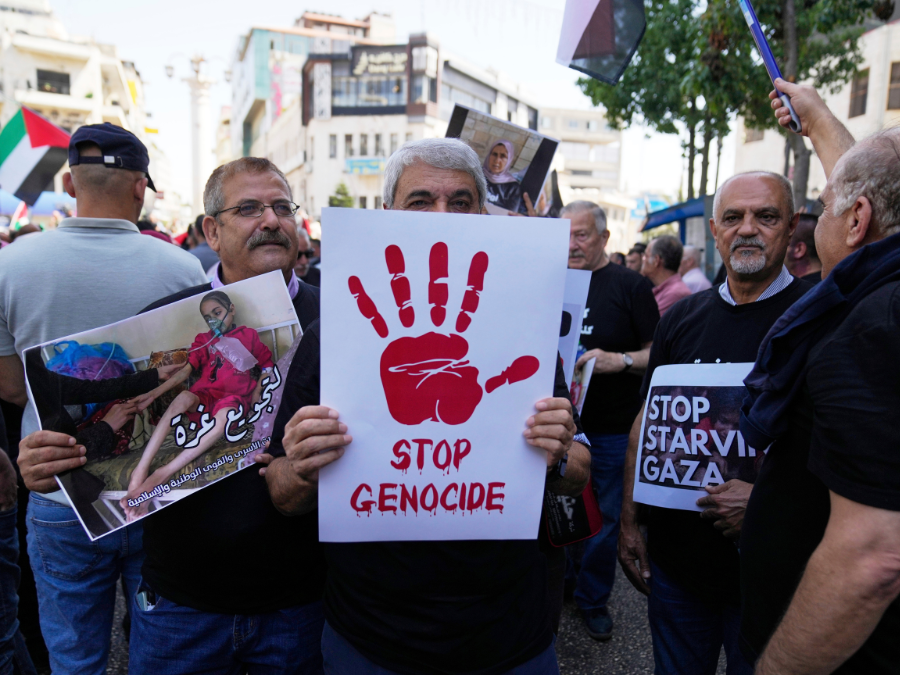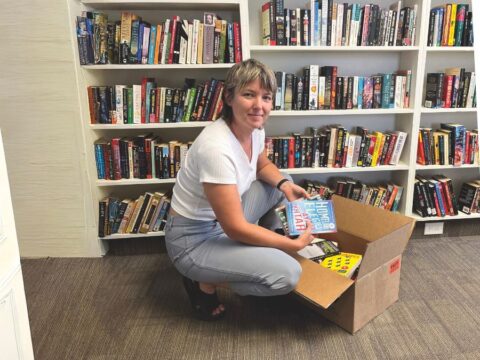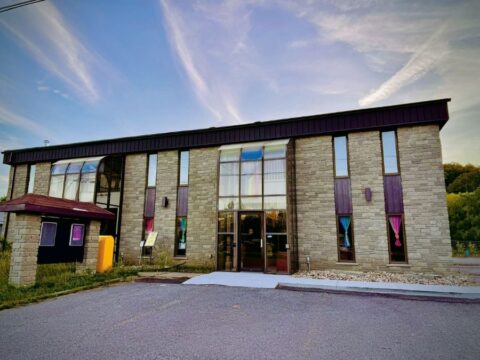The United Church of Canada has approved several proposals related to justice and peace in Palestine, further cementing its strong opposition to Israel’s military offensive in Gaza.
The 45th General Council reconvened online on Sept. 13 to wrap up business carried over from its August meeting in Calgary. The carried proposals include an emergency resolution on Gaza and a proposal to formally endorse the Jerusalem Declaration on Antisemitism (JDA) definition of antisemitism. Among other proposals, General Council also decided to develop a post-Gaza theology and revisit it at its annual meeting in 2026.
You may unsubscribe from any of our newsletters at any time.
Emergency Resolution on Gaza
Just days before General Council gathered in Calgary, Israeli Prime Minister Benjamin Netanyahu announced his intention to fully occupy Gaza. That motivated Rev. Maria Christina Conlon to rise at the Calgary meeting to propose an emergency resolution on Gaza.
Recalling the Calgary meeting, Conlon tells Broadview, “I was looking at all our documents and proposals, and there was nothing that actually talked about Israel’s action as genocide,” Conlon says. “I said, ‘We have to talk about this,’ and the General Secretary told me, ‘Well, you have until the end of the day to submit your proposal.’” Conlon reached out to some colleagues for help and quickly began writing. Unfortunately, General Council ran out of time in August, so the vote on Conlon’s proposal was postponed to the September meeting.
“Who said that genocide was a bad word in terms of identifying what is going on?” Conlon asks in a conversation with Broadview following the recall meeting. “We are the church, and we believe that this is a sin against God and humanity.”
Conlon’s proposal recommended that The United Church of Canada denounce the planned erasure of Gaza City, join international experts in naming the crisis in Gaza a genocide (which it began doing in November 2023), call on the federal government to immediately hold the Israeli government accountable to its violations of international laws through sanctions and join the International Court of Justice case against Israel and declare a time of fasting, prayer and protest.
The resolution was carried with no amendments or further discussion.
Antisemitism Definition
“I’ve been concerned about what’s going on in Israel-Palestine for quite a while,” says JDA proposal writer and retired lawyer George Barlett, in an interview with Broadview following the recall meeting.
Bartlett first travelled to Palestine in 2006 and has led a number of visits to the region with his spouse. In 2017, he spent three months there as an ecumenical accompanier with the World Council of Churches, witnessing and documenting what he saw.
Bartlett’s proposal called on The United Church of Canada to formally endorse the JDA definition of antisemitism instead of the International Holocaust Remembrance Alliance (IHRA) definition. Canada adopted the non-legally binding IHRA definition in 2019. Critics of the definition say some of its examples of antisemitism create a chill effect, or as Bartlett contends, “prevent criticism of what Israel is doing.”
Although the JDA is considered the more liberal of the two definitions, it too has been criticized for preserving colonial power structures and leaving open the opportunity to conflate advocacy for Palestine with antisemitism. According to Bartlett’s proposal, the JDA definition is “endorsed by a growing list of scholars in the fields of Holocaust history, Jewish studies and Middle East studies.”
Bartlett knows The United Church of Canada already uses the JDA definition. “I thought just telling people in an email that they use it wasn’t enough, that given all the pressure on governments to adopt the IHRA definition that the United Church should speak out and let the world know that we see problems with that definition,” he says.
The proposal, which passed with an overwhelming majority, directs the General Secretary to apply the Principles for Justice Work in taking actions such as communicating this endorsement with the federal government and asking it not to promote the IHRA definition of antisemitism “because it does not sufficiently respect the rights of Canadians guaranteed by the Charter of Rights and Freedoms.”
Other Proposals
A proposal to develop theology for a post-Gaza world was passed with an amendment for the work to be brought back to General Council’s annual meeting in 2026.
The proposal notes that the atrocities in Gaza have caused many “to realize that the international rules-based order as well as many theological understandings that emerged after World War II now lay in ruin under the rubble of Gaza.” It also acknowledges that Palestinians have “long struggled against Zionism, Christian Zionism, Apartheid, Christian Nationalism and an entrenched acceptance of Israel’s settler-colonial project backed by Western powers.”
The proposal recommends that a task group be struck to support and collaborate with Global Kairos Palestine and Sabeel Education and Liberation Theology, The United Church’s Palestinian partners. In turn, the task group will review Bearing Faithful Witness, the United Church’s document on United Church-Jewish relations, which the 38th General Council approved in 2003. The task group will consider whether the policy contributes to anti-Palestinian bias and whether its silence on Zionist ethnonationalism adds to the oppression of Palestinians.
Four regional proposals that had the overwhelming support of the discussion groups in Calgary and were combined by the General Council’s Way Forward committee were also carried. These proposals call on the federal government to act for justice in Palestine/Israel, emphasize the need for a Palestinian state, appeal to Canada to renounce administrative detention of Palestinians and demand peace in Israel and Palestine through equal rights.
Finally, a proposal to become an Arms Embargo Now signatory was also carried, however, no further action was required because The United Church of Canada has been a signatory since August 2024.
***
Leslie Sinclair is a journalist in Toronto.















I have a question: Has anyone within General Council ever read the “Covenant of the Islamic Resistance Movement?” It is available on line. Simply type Hamas Charter. I was going to include some quotations from it but I fear readers would feel I’d be “cherry picking” so I invite readers to read it for themselves and then ask whether or not the Jews have a right and an obligation to not only defend themselves but to obliterate Hamas. Reason only works with reasonable people and those who have been indoctrinated with an idea since birth cannot be reasoned with. I do ask, however, that folks not reply to my comment until they have read the Hamas charter.
Sheldon, I honour of your request before I comment. “The original Charter identified Hamas as the Muslim Brotherhood in Palestine and described its members to be god-fearing Muslims raising the banner of Jihad (armed struggle) in “the face of the oppressors”. The 1988 charter defines the struggle to be against the Jews and calls for the eventual creation of an Islamic Palestinian state in all of former Mandatory Palestine, and the obliteration or dissolution of Israel.” (Wikipedia)
Most people do not realize that the Muslim “brotherhood” does not want the Gazan’s, they are troublemakers within their own people. Palestine is NOT a nation it is a regional area and called a state (more or less many states under a name). It’s current “state” was created by Britain. Gaza was held by Egypt and the West Bank was held by Jordan. One would think that after the 6 Day War, Egypt and Jordan would put up a fight to get their respective lands back. (I’m thinking both countries were willing to let Israel deal with them.) 2005 Israel withdrew from the Gaza strip which lead to a civil war within it (Hamas/Fatah conflict) If Israel really wanted to commit genocide in Gaza, that was the time to do it. The current government (the PNA) governs Palestine in an authoritarian manner, by repressing activists and journalists critical of the government, in other words a dictatorship. Although I feel for the people in Gaza, they are the ones who wanted this type of government and idealism, and are now living under the consequences.
Gary, though we may differ in our theologies somewhat, I am glad that you have the interest, as I do to go into the history and the social context of the Gaza/Israel war. Many folks who protest and shout slogans without knowing this context are simply being used as tools by Hamas. Hamas leaders are not stupid. They have learned the art and the value of propaganda. I, too, feel for many of the people but as I have learned that on October 7 when Hamas attacked there were also civilians who followed them to loot and take part in the murders. But sometimes ones compassion can be too deep. These people voted for Hamas. It’s a war and it’s been ongoing for quite some time, and, in my humble opinion, Hamas will merely regroup and in another ten years when a new generation is old enough to take up a gun, they will begin again.